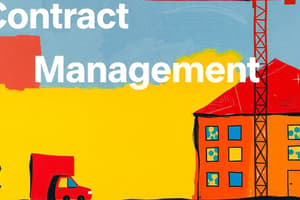Podcast
Questions and Answers
What is the primary purpose of a risk register in project management?
What is the primary purpose of a risk register in project management?
- To record the financial budget of the project
- To serve as a communication tool for project stakeholders
- To outsource risk management responsibilities
- To document identified potential risks that could affect the project (correct)
Which of the following techniques is used in risk assessments?
Which of the following techniques is used in risk assessments?
- Impact analysis based on stakeholder feedback
- Comparative analysis with past project outcomes
- Simple majority voting among team members
- Severity multiplied by frequency multiplied by number of people affected (correct)
Which risk response strategy involves taking immediate steps to diminish the potential negative impact of a risk?
Which risk response strategy involves taking immediate steps to diminish the potential negative impact of a risk?
- Mitigate (correct)
- Eliminate
- Accept
- Transfer
Which of the following is NOT a rule of risk-taking?
Which of the following is NOT a rule of risk-taking?
What types of risks are included in Enterprise Risk Management (ERM)?
What types of risks are included in Enterprise Risk Management (ERM)?
What are foreseen risks in project management?
What are foreseen risks in project management?
Which of the following is NOT part of the Project Risk Management process according to PMBOK?
Which of the following is NOT part of the Project Risk Management process according to PMBOK?
What is the primary goal of a Risk Management System in a project?
What is the primary goal of a Risk Management System in a project?
How are risk response strategies categorized in project management?
How are risk response strategies categorized in project management?
Which of the following best describes the role of a Project Manager in risk management?
Which of the following best describes the role of a Project Manager in risk management?
What does performing qualitative risk analysis involve?
What does performing qualitative risk analysis involve?
How should a project manager respond to a risk that has been identified?
How should a project manager respond to a risk that has been identified?
Flashcards
Risk Removal
Risk Removal
Eliminating the root cause of a potential threat, preventing it from occurring altogether.
Risk Transfer
Risk Transfer
Transferring responsibility for a risk to another party, like an insurance company or an external vendor.
Risk Mitigation
Risk Mitigation
Taking steps to lessen the potential impact of a risk, even if it can't be fully eliminated.
Risk Acceptance
Risk Acceptance
Signup and view all the flashcards
Risk Register
Risk Register
Signup and view all the flashcards
Project Risk
Project Risk
Signup and view all the flashcards
Foreseen Risks
Foreseen Risks
Signup and view all the flashcards
Unforeseen Risks
Unforeseen Risks
Signup and view all the flashcards
Project Risk Management
Project Risk Management
Signup and view all the flashcards
Identify Risks
Identify Risks
Signup and view all the flashcards
Perform Qualitative Risk Analysis
Perform Qualitative Risk Analysis
Signup and view all the flashcards
Perform Quantitative Risk Analysis
Perform Quantitative Risk Analysis
Signup and view all the flashcards
Plan Risk Responses
Plan Risk Responses
Signup and view all the flashcards
Study Notes
Course Information
- Course Title: PROJECT MANAGEMENT
- Course Code: 0404438
- Course Leader: Prof. Alex Opoku (PhD, MSc, BSc (Hons), PGCHE, FHEA, MCIOB, FRICS)
- Professor of Sustainable Built Environment
Lecture Overview
- Topic: Project Risk Management
Course Learning Outcomes
- Understand what a project is, what project management is, and the role and responsibilities of the project manager within the construction team
- Understand how project managers manage projects by integrating scope, time, cost, quality, human resources, communications, risk, and procurement of a project
- Apply methods for estimating time and cost and managing quality in a construction context
- Understand theories of leadership, communication, motivation, and conflict management within teams
- Understand procurement and risk management and how they are related
Project Management Knowledge Areas
- Project Initiation
- Project Planning
- Project Execution
- Monitoring & Controlling
- Project Closing
- Project Integration Management
- Project Scope Management
- Project Time Management
- Project Cost Management
- Project Quality Management
- Project Human Resources Management
- Project Communications Management
- Project Risk Management
- Project Procurement Management
- Project Stakeholder Management
What is Risk?
- Risk is concerned with unpredictable events that may occur in the future
- The exact likelihood and outcome of these events is uncertain
- These events could potentially affect stakeholder objectives/interests
Categories of Project Risk
- Foreseen Risks: Identified but have uncertain influences on the project
- Unforeseen Risks: Not formally identified in the planning stage, are not anticipated, and have no mitigation plan
Project Management Process Groups
- Initiating
- Planning
- Executing
- Monitoring & Controlling
- Closing
Risks across the PM Knowledge Areas
- Risks related to scope, time, cost, quality, integration, human resources, communications, and procurement influence project risk
Examples of Project Risk
- Technical Risk: Scope definition, requirements definition, technical processes, technology, technology scaling, performance, reliability, safety, security, test, and acceptance
- Management Risk: Project management, organization, project resources, communication, information sharing, corporate policy, reputation
- Commercial Risk: Contractual terms/conditions, financing, liabilities/warranties, payment terms, suspension/termination, internal procurement, subcontracts, client stability, applicable law, partner financial stability, partner experience
- External Risk: Legislation/regulatory, exchange rates, site/facilities, competition, weather, political, special interest groups
Risk Management System
- The process of identifying, analyzing, and responding to risk
- Includes maximizing positive risks and minimizing the consequences of negative risks
- A system that identifies and quantifies risks to which a project is exposed so that conscious decisions on how to manage the risks can be made
Project Risk Management Process
- Plan Risk Management
- Identify Risks
- Perform Qualitative Risk Analysis
- Perform Quantitative Risk Analysis
- Plan Risk Responses
- Implement Risk Responses
- Monitor Risks
How Do We Manage Risk?
- Risk Planning: Define scope, team, strategy
- Risk Identification: Identify risk event, impact, and probability
- Risk Analysis: Analyze quantitatively, qualitatively, and as a combination
- Risk Response Planning: Define action plan, assign action officer, and specify resolution date
- Risk Monitoring & Control: Regularly assess and re-evaluate the risk
Project Risk Response Strategy
- Avoid
- Reduce
- Contingency Plan
- Accept
- Transfer
- Share
- Escalate
- Terminate
- Treat
- Tolerate
- Mitigate
Risk Response: Meaning of Terms
- Avoid: Change the plan to bypass the issue, remove the cause of the threat
- Transfer: Outsource the risk to a different team or agency
- Mitigate: Reduce the impact of the risk
- Accept: Assume the negative impact and budget for dealing with it
Risk Register
- The document used to record identified potential risks that could affect the execution of a project
- Maintained by the integrated project team, and regularly updated
- Risk management plans may be recorded in or linked to the risk register
Risk Assessments
- Techniques include determining severity x frequency x number of people affected
- R = S x (F x N)
Risk Management & Stakeholders
- Project Risk Roles: Project Sponsor, ERM, Risk Owners, Project Manager, Project Management Team, Risk Manager, PMO
Rules of Risk Taking
- Never risk a lot for a little
- Don't risk more than you can afford to lose
- Don't take risks based on principle
- Don't take risks to save face
- Always analyze the source and consequences of a risk
- Have an alternative plan (plan B)
Summary
- Project risk management involves identifying, analyzing, and responding to risk during the life of a project in order to benefit the project objectives.
Studying That Suits You
Use AI to generate personalized quizzes and flashcards to suit your learning preferences.




